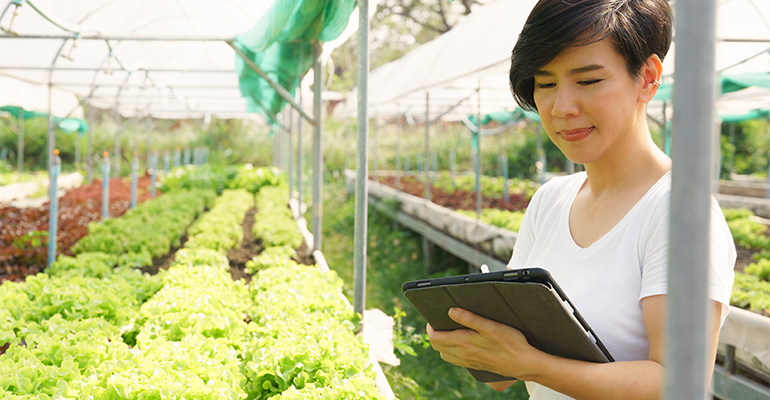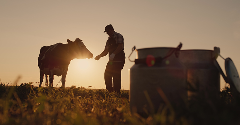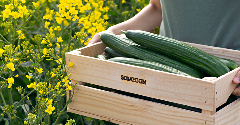News
Hyperlocalisation promotes food system resilience and diversification
30 Aug 2022
Climate change action and new technologies are driving a rise in hyperlocalisation throughout the global food chain, improving the industry’s adaptability and ability to meet consumer demands for greater choice.
Hyperlocalisation involves creating shorter supply chains and establishing or redesigning operations to allow food production to occur in the same local environment as the end consumer. With a focus on supply chains that are both short and sustainable, localisation has evolved into hyperlocalisation, growing food as close to where consumers eat as possible.

Creating a flexible and sustainable food system
As calls to protect and preserve the planet become louder among consumers and the wider industry, strengthening and securing the future of food is paramount. Increasingly, food players focus more on the region and city where goods are produced, recognising their longer-term benefits for the global food system. Food producers see hyperlocalisation as a clear way to improve the industry’s resilience while reducing emissions and lowering climate impact.
The Working Group III contribution to the Intergovernmental Panel on Climate Change’s (IPCC) Sixth Assessment Report indicates society’s perception of transformative change. It states that technologies such as digitisation and automation, the Covid-19 pandemic, and human-induced global warming are leading to labour market changes that create uncertainty and ambiguity. However, societies can benefit from these if they adopt an embracive approach and are willing to explore ways to improve life (Chapter 5, p. 192).[1]
While hyperlocalisation in the food supply chain has not been assessed in the IPCC Working Group’s latest assessment report, “individuals (in this case as customers) play a crucial role in transforming our food system and making it more climate-resilient and sustainable”, says Sina Löschke, communications manager at the IPCC’s Working Group II Technical Support Unit.
Transparency about food traceability, food loss and waste, changing dietary patterns, and local food options contributes to strengthening the world’s food system and reducing its vulnerability.
Increasing food varieties
In today’s food industry, many options are available to both retailers and consumers. Diversification of products and their ingredients is therefore desirable. The ability to deliver variety while maintaining hyperlocalisation becomes a key consideration for food producers.
Diversified local agriculture is considered an example of mitigation contributing to food stability, the IPCC’s Special Report on Climate Change and Land says in Chapter 5, p.443.[2] Local food systems are deemed to be one way to increase performance and efficiency in the food system, which may result in higher resilience and lower risks (Chapter 5, p.468).[3]
Global food aid provides a way to offer food security and save lives following climate disasters, the report continues. It states that based on industry assessments indicating the likelihood that extreme weather such as heatwaves, droughts, and flooding will increase, food stability is expected to decrease and food insecurity to rise (Chapter 5, p.464).[4]
 ©AdobeStock/myboys.me
©AdobeStock/myboys.me
New technologies in controlled environment agriculture
From an agricultural perspective, controlled environment agriculture (CEA), which grows crops in managed conditions, provides solutions. Examples of CEA include indoor farm management systems, hydroponics, aeroponics, smart sensors, and robotics to reduce labour costs. “CEA can replicate diverse growing conditions, allowing for the proliferation of crop varieties,” says Anne Greven, global head of food and agriculture startup innovation at banking company Rabobank.
Increasingly, technology-based approaches provide controlled growth, with supply chain optimisation, digital marketplaces, and vertical farming rising in popularity among producers exploring hyperlocalisation. In particular, technologies that showcase a sophisticated two-way network between food growers and consumers are boosting hyperlocalisation developments.
The Foodbytes! networking platform, which is part of Rabobank, sees CEA-enabling technologies as playing a “pivotal role in scaling and reaching cost parity”, it states in its food report published in July. With inflation affecting the food industry’s production capabilities, automation and digitalisation technologies can be vital in reducing local production costs, the report adds. Combining local food production with technologies offers manufacturers a way to decrease production times and enhance sought-after plant traits, which can improve plant quality and yields.
Embracing the shift
Sourcing food locally appeals to today’s consumers, who want to support local farmers and businesses while reducing their environmental impact. “Food retailers can focus on ‘fresh’ and ‘local’ as consumers are increasingly gravitating towards these attributes,” says Greven. Consumer preference for “environmental/sustainable” items grew by 26 points, “local country origin” went up by 20 points, and food “from my local neighbourhood” rose by 18 points over the past two years, data from market measurement firm Nielsen’s 2022 State of Consumers report shows, indicating customers’ increased likelihood to buy these products.
However, the industry recognises that achieving full hyperlocalisation may be challenging, with Greven highlighting that food brands “don’t need to go 100% hyperlocal, but [can] consider local ingredient supply chains when sourcing and reformulating”.
Reference list:
[1] Intergovernmental Panel on Climate Change Sixth Assessment Report (2022). Climate Change 2022: Impacts, Adaptation and Vulnerability. The Working Group III contribution to the IPCC Sixth Assessment Report. Chapter 5, p.192. https://report.ipcc.ch/ar6wg3/pdf/IPCC_AR6_WGIII_FinalDraft_Chapter05.pdf
[2] Mbow, C., C. Rosenzweig, L.G. Barioni, T.G. Benton, M. Herrero, M. Krishnapillai, E. Liwenga, P. Pradhan, M.G. Rivera-Ferre, T. Sapkota, F.N. Tubiello, Y. Xu, 2019: Food Security. In: Climate Change and Land: an IPCC special report on climate change, desertification, land degradation, sustainable land management, food security, and greenhouse gas fluxes in terrestrial ecosystems. [P.R. Shukla, J. Skea, E. Calvo Buendia, V. Masson-Delmotte, H.-O. Pörtner, D.C. Roberts, P. Zhai, R. Slade, S. Connors, R. van Diemen, M. Ferrat, E. Haughey, S. Luz, S. Neogi, M. Pathak, J. Petzold, J. Portugal Pereira, P. Vyas, E. Huntley, K. Kissick, M. Belkacemi, J. Malley, (eds.)]. In press. Chapter 5, p.443. https://www.ipcc.ch/site/assets/uploads/sites/4/2021/02/08_Chapter-5_3.pdf
[3] Mbow, C., : Food Security. In: Climate Change and Land: an IPCC special report on climate change, desertification, land degradation, sustainable land management, food security, and greenhouse gas fluxes in terrestrial ecosystems. Chapter 5, p.468. https://www.ipcc.ch/site/assets/uploads/sites/4/2021/02/08_Chapter-5_3.pdf
[4] Mbow, C., : Food Security. In: Climate Change and Land: an IPCC special report on climate change, desertification, land degradation, sustainable land management, food security, and greenhouse gas fluxes in terrestrial ecosystems. Chapter 5, p.464. https://www.ipcc.ch/site/assets/uploads/sites/4/2021/02/08_Chapter-5_3.pdf
Related news

Soy story: WWF scores UK supermarkets on sustainability efforts
12 Nov 2025
WWF has published its latest “Soy Scorecard”, ranking UK supermarkets’ efforts to combat deforestation and land conversion in their soy supply chains.
Read more
Standing Ovation and Bel scale up casein production from dairy co-products
11 Nov 2025
Foodtech company Standing Ovation has partnered with cheese specialist Bel Group to manufacture dairy serums for industrial-scale casein production via precision fermentation.
Read more
New UPF standard hoped to offer consumers ‘coherence and clarity’
10 Nov 2025
Ingredients companies are being urged to enter “a new era of partnership and innovation” following the launch of the industry’s first non-UPF verification scheme.
Read more
Whistleblowers accuse UK meat industry of promoting cheap, unsustainable supply
7 Nov 2025
An anonymous group of industry insiders has accused the UK’s biggest food companies of systematically driving down meat quality and welfare standards.
Read more
Bord Bia presents Irish dairy ingredient suppliers at Fi Europe
6 Nov 2025
Dairygold Co-operative Society, The Carbery Group, and Ornua Co-operative: Meet with sustainable producers of Irish dairy ingredients at Food ingredients Europe 2025, Hall 7.2 Stand M18.
Read more
AI attraction means foodtech startups must ‘prove’ rather than ‘promise’
4 Nov 2025
Reports suggest that artificial intelligence (AI) is sucking investment from foodtech and agritech, but investors say the picture is complicated.
Read more
Penguin and Club bars no longer classed as chocolate
30 Oct 2025
Penguin and Club bars can no longer be classified as chocolate after the pladis-owned McVitie’s brands turned to cheaper alternatives amid the ongoing cocoa crisis.
Read more
Could plant-based protection replace plastic packaging?
29 Oct 2025
Swedish foodtech company Saveggy has launched an additive-free plant-based protection for cucumbers, offering a waste-free packaging solution for fruit and vegetables.
Read more
Does promoting protein content push up plant-based sales?
27 Oct 2025
Promoting the protein content of meat-free products is a more effective sales strategy than adding carbon labels, a study of UK bakery chain Greggs suggests.
Read more
Amazon Grocery launch aims to balance quality with affordability
22 Oct 2025
Global e-commerce giant Amazon has introduced a new private-label food brand, combining existing Amazon Fresh and Happy Belly products with new everyday items.
Read more